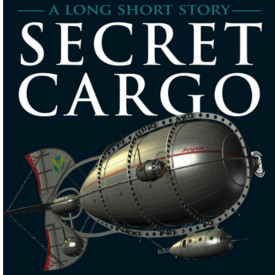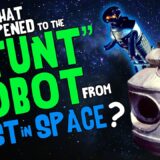
Among the diverse fauna of Science Fiction and Fantasy anthologies, there is a species in which writers choose what they consider to be their best works. It is, I presume, and editor Mike Resnick hints at such in his introduction to This is My Funniest: Leading Science Fiction Writers Present Their Funniest Stories Ever, rather frustrating when a writer selects something that the editor does not feel is the writer’s best. The difference is probably even more glaring in a humor anthology than in other author’s choice anthologies due to the particular nature of humor. This is not to suggest that the stories in this anthology are not funny, and honestly, many of these are among the authors’ funniest, but there are some selections that leave you scratching your head. Case in point: is there really anyone, other than the late William Tenn, who thinks that “The Lemon-Green Spaghetti-Loud Dynamite-Dribble Day” is Tenn’s funniest story? I suppose there must be someone, but it is hard for me to imagine.
In any case, a well written story can usually stand on its own even if the reader does not see what is funny about it. The twenty-nine authors represented in This is My Funniest are a rather illustrious and talented group, so you will find the stories to be of high quality even if some of them fail to tickle your funny bone. Each story is introduced by the author with a short explanation as to how the story came into being or why the author thinks the story is funny. Some of these introductions are entertaining, in and off themselves.
Here is a brief, and mostly spoiler free, inventory of what you can expect to find in this This is My Funniest:
“Space Rats of the C.C.C.” by Harry Harrison — Military recruits train for the Combat Camel Corps. Classic Harrison, a hilarious spoof of space opera, reminiscent of Bill, the Galactic Hero.
“The Lemon-Green Spaghetti-Loud Dynamite-Dribble Day” by William Tenn — LSD in the Manhattan water supply. For my money, Tenn was one of the finest humorists in SF. This is not a bad story, it’s just not one of his funniest in my opinion.
“Dick W. and His Pussy; or, Tess and Her Adequate Dick” by Jane Yolen — Feminist anatomy envy. Bawdy and vulgar. If you find the story title offensive, you should probably stop there.
“Night of the Cooters” by Howard Waldrop — H.G. Wells’ The War of the Worlds comes to Texas. The story begins with a dedication to Slim Pickens and one can’t help but see him in the lead role as Sherriff. Nominated for a Hugo in 1988. Lots of fun!
“A Delightful Comedic Premise” by Barry N. Malzberg — Written as correspondence between Malzberg and Ed Ferman (longtime editor of The Magazine of Fantasy and Science Fiction) in which Ferman, upon hearing that Malzberg is actually a rather funny person, requests that he submit a humorous story rather than a gloomy one. A self-effacing and funny look at the sometimes over-serious side of SF and the sad economic plight of the SF writer.
“The Capo of Darkness” by Laura Resnick — Lucifer and his top minion, mafia style, are approached by Eve (of Adam and Eve fame) seeking revenge. She wants them to put out a contract on Yahweh. Good stuff.
“Franz Kafka, Superhero!” by David Gerrold — Two views of reality clash in Vienna, Austria when Franz Kafka (Bug-Man) takes on his arch-nemisis, Sigmund Freud (PsycheMan).
“Too Hot to Hoot” by Spider Robinson — Murphy’s Law and a series of mishaps beset a man whose partner is nine and a half months pregnant. An excerpt from the novel Callahan’s Legacy.
“Amanda and the Alien” by Robert Silverberg — A teenage California girl, bored and looking for fun, takes home a dangerous alien to teach it how to act more human. Social commentary on California culture.
“Faith” by James Patrick Kelly — On the rebound from a divorce, a woman sets out on the tumultuous waters of dating and meets an odd man.
“The Growling” by Jody Lynn Nye — A village of warrior women, whose men have been gone for a long time, start to have synchronized PMS. Men of the Ma Cho tribe think the women will make easy helpless prey.
“Alien Radio” by Nick DiChario and Mike Resnick — An alien comes to earth to deliver five basic truths of human existence via a call-in talk radio show. Quite funny.
“Primordial Chili” by Tom Gerencer — Everything aligns perfectly to make the best chili ever in the universe. More interesting than it sounds.
“The Dog Said Bow-Wow” by Michael Swanwick — Two con “men” (one is actually a genetically altered dog) out to score big in the post-digital age with only their wits and an old computer modem. The first of Swanwick’s Darger and Surplus stories, it won the 2002 Hugo for short story.
“Sweet, Savage Sorcerer” by Esther Friesner — Good parody of bodice-ripper fantasy.
“The Hanging Curve” by Gardner Dozois – Something bizarre happens during the final pitch of the World Series.
“Deus Tex” by Jack McDevitt — Thieves plan a heist at a dead man’s residence before the authorities can get there and find an assortment of divine objects once belonging to the gods.
“The Flim-Flam” Alien by Ralph Roberts — In the future, a southern man trades some war medals and a holoTV to an alien for three wishes.
“Present” by Kristine Kathryn Rusch — A woman whose husband is having trouble with his timing in bed brings home a time travel device intended to make the experience last longer.
“You’ll Catch Your Death of Colds” by Bill Fawcett — Ingmar Bergman spoof of a man playing Risk with Death, or rather a lesser death whose role in the hierarchy has been reduced by modern medicine.
“The Usurper Memos” by Josepha Sherman — A villainous usurper of the throne becomes frustrated when he is bogged down by bureaucracy. Done via memos sent back and forth between the king and various underlings.
“Patent Infringement” by Nancy Kress — Excellent satire of drug companies and lawyers manipulating the system and abusing gene patenting laws. Written as a series of press clippings, letters and memos.
“Ickies in Mirrorshades“ by David Brin — Cyberpunk blended with space opera in Brin’s Uplift Universe. Apparently intended as part of Gorilla My Dreams, a novelette released a few years later.
“Ligdan and the Young Pretender” by Walter Jon Williams — A military man on leave dates a brawny Scottish military lass. She takes him to the family castle transported to the planet one hundred years ago, complete with family ghosts.
“A !Tangled Web” by Joe Haldeman — A man trying to make a business deal for land with aliens has competition from an unscrupulous competitor.
“Revolt of the Sugar Plum Fairies” by Mike Resnick — Very funny story of cute, little, blue fairies out for bloody revenge. But first they have to get unstuck from the floor of Arthur Crumm’s basement.
“Myth Manners’ Guide to Greek Missology #1: Andromeda and Perseus” by Harry Turtledove — A lusty retelling of the myth with the roles of Andromeda and Perseus reversed and most of the particulars altered for comedic effect. Not for the kiddies.
“The Soul Selects Her Own Society: Invasion and Repulsion: A Chronological Reinterpretation of Two of Emily Dickinson’s Poems: A Wellsian Perspective” by Connie Willis — Emily Dickenson’s poems reinterpreted as eye-witness accounts of H.G. Wells’ War of the Worlds invasion (despite Dickenson being dead at the time). A hilarious parody of academic papers, complete with lots of funny little foot notes. Even more fun if you are familiar with Dickenson, academics and The War of the Worlds. A must read. Winner of the 1997 Hugo for short story.
“Cordle to Onion to Carrot” by Robert Sheckley — Cordle, a man tired of being pushed around by the bullies of the world, has an LSD induced, quasi-mystical experience and decides to try out life from the other (bully) side.
The humor level in This is My Funniest ranges from outright hilarious to mildly funny. And although I may not agree with the authors’ selections in all cases, almost all the stories are funny, making this anthology worthy of a full Scide Splitters endorsement. Published in 2006, the book is still readily available new in trade paper and will satisfy most humor and SF/F enthusiasts.










